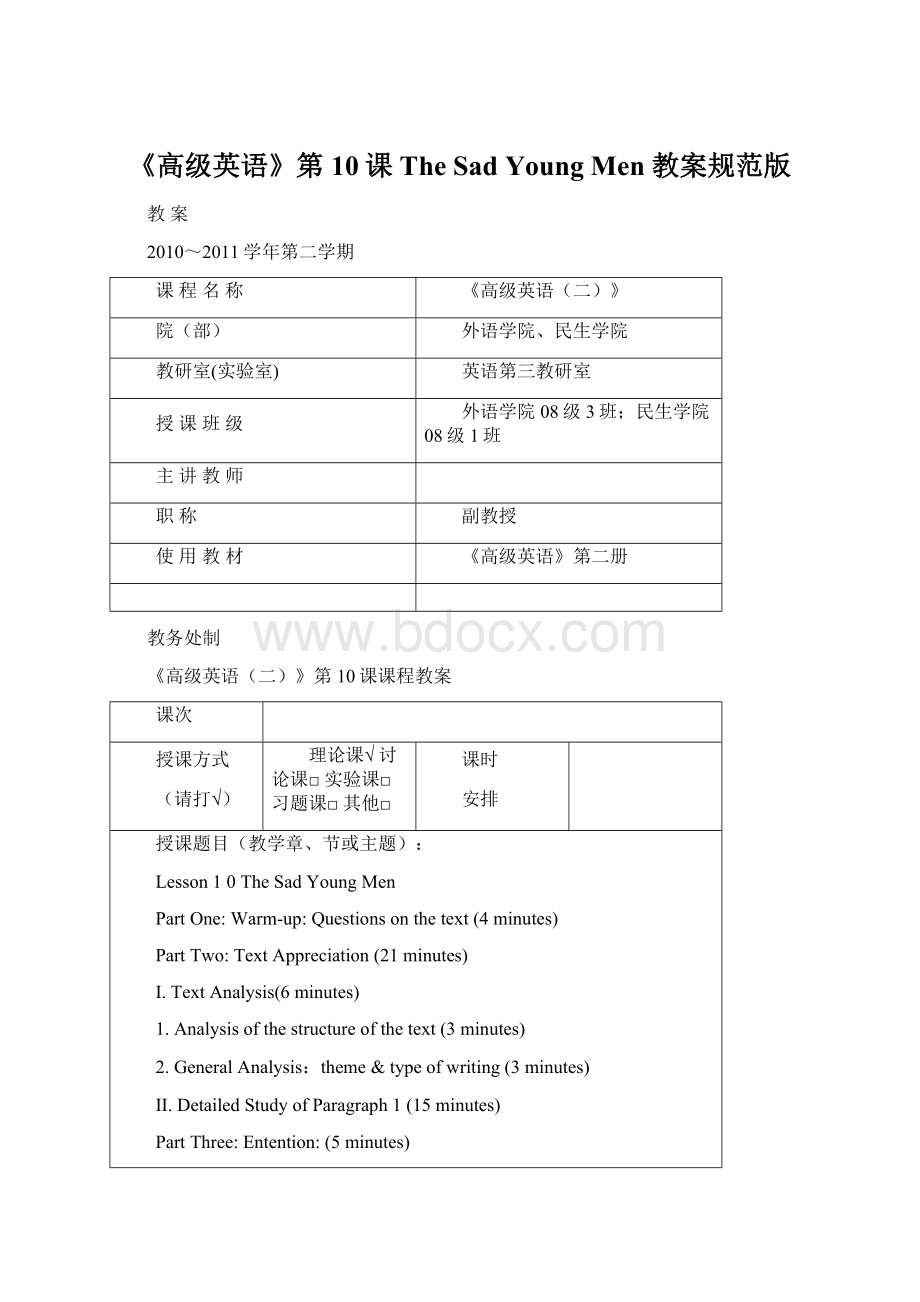《高级英语》第10课 The Sad Young Men 教案规范版Word格式文档下载.docx
《《高级英语》第10课 The Sad Young Men 教案规范版Word格式文档下载.docx》由会员分享,可在线阅读,更多相关《《高级英语》第10课 The Sad Young Men 教案规范版Word格式文档下载.docx(8页珍藏版)》请在冰豆网上搜索。

课次
授课方式
(请打√)
理论课√讨论课□实验课□习题课□其他□
课时
安排
授课题目(教学章、节或主题):
Lesson10TheSadYoungMen
PartOne:
Warm-up:
Questionsonthetext(4minutes)
PartTwo:
TextAppreciation(21minutes)
I.TextAnalysis(6minutes)
1.Analysisofthestructureofthetext(3minutes)
2.GeneralAnalysis:
theme&
typeofwriting(3minutes)
II.DetailedStudyofParagraph1(15minutes)
PartThree:
Entention:
(5minutes)
I.Discussion(3minutes)
II.Assignment(2minutes)
教学目的、要求(分掌握、熟悉、了解三个层次):
1.Improvingstudents’abilitytounderstandthetextproperly.
2.Helpingstudentstounderstandingrhetoricaldevices.
3.Encouragingstudentstovoicetheirownviewpointfluentlyandaccurately.
教学重点及难点:
1.Understandingofthe“SadYoungMen”;
2.Understandingofthetheme;
3.Analysisandusageoftransferredepithet;
4.Paraphrasingofthefirsttwosentences
教学基本内容
方法及手段
多媒体演示
学生发言
举例讲解
师生讨论
作业、讨论题、思考题:
1.Findouttheexamplesoftransferredepithet,simile,metaphorandmetonymyusedinthistext.
2.Wastherereallyarevoltoftheyoungergeneration?
Howshouldweviewittoday?
课后小结:
Questionsonthetext
TextAppreciation
I.TextAnalysis:
thestructure,theme&
typeofwritingoftheessay
II.DetailedStudyofParagraph1
Discussion&
Assignment
附页:
AdvancedEnglish(II)
LessonTen
TheSadYoungMen
Outline:
Answerthefollowingquestionsonthetext:
1.WhatdoyouknowabouttheauthorsRodW.Horton&
HerbertW.Edwards?
RodW.Horton&
HerbertW.EdwardswerethejointauthorsofthebookBackgroundsofAmericanLiteraryThought,fromwhichthispieceistaken.
2.WhatdoyouknowabouttheSadYoungMen?
ThistermwasfirstcreatedbyF.ScottFitzgeraldinhisbookAlltheSadYoungMen,todescribethedisillusionedpost-WorldWarIyoungergeneration,whorebelledagainstformeridealsandvalues,butcouldreplacethemonlybydespairofacynicalhedonism.
ItisalsotermedasTheLostGeneration.TheremarkofGertrudeStein,“youareallalostgeneration”,addressedtoHemingway,wasusedasaprefacetothelatter’snovelTheSunAlsoRises.
AnexcerptfromtheprefaceofTheSunAlsoRises:
Youareallalostgeneration.
---GertrudeSteininConversation
¨
Onegenerationpassethaway,andanothergenerationcometh;
buttheearthabidethforever...Thesunalsoariseth,andthesungoethdown,andhastethtotheplacewherehearose...Thewindgoethtowardthesouth,andturnethaboutuntothenorth;
itwhirlethaboutcontinually,andthewindreturnethagainaccordingtohiscircuits....Alltheriversrunintothesea;
yettheseaisnotfull;
untotheplacefromwhencetheriverscome,thithertheyreturnagain.¨
Howdoestheauthororganizehisessay?
PartI
(1):
Introduction
TheauthorsintroducethesubjecttheSadYoungMentothereaders.
PartII(29):
Supportingdetails
Theauthorssupplysomehistoricalmaterialsconcerningtherevoltoftheyoungergenerationinthe1920s.
PartIII(10-11):
Conclusion
Theauthorsarriveattheconclusionthatthe“lostgeneration”wasneverlost.
typeofwriting(5minutes)
Themeoftheessay:
Thethemeissummedupattheveryend:
TheintellectualsoftheTwenties,the“sadyoungmen”,asF.ScotFitzgeraldcalledthem,cursedtheirluckbutdidn’tdie;
escapedbutvoluntarilyreturned;
flayedtheBabbittsbutlovedtheircountry,andinsodoinggavethenationtheliveliest,freshest,moststimulatingwritinginitsliteraryexperience.
TypeofWriting:
Thisessayisanexpositorywriting,explainingacertainperiodinAmericanliteraryandsocialhistory,focusingontheattitudesandrevoltoftheyoungpeoplewhoreturnedfromWWI,disappointedanddisillusioned.
1.NoaspectoflifeintheTwentieshasbeenmorecommenteduponandsensationallyromanticizedthantheso-calledRevoltoftheYoungerGeneration.:
Noaspectoflife…more…than:
AfterWWI,duringthe1920s,everyaspectoflifeintheU.S.hasbeencommentedupon,buttheso-calledRevoltoftheYoungerGenerationhasbeenmorecommenteduponthanallotheraspects.
sensationallyromanticized:
sensationallyromanticized:
treatedinapassionate,idealizedmannertoshock,thrillandrousetheinterestofpeople.
Howdoyouparaphrasethissentence?
TheRevoltoftheYoungerGenerationinthe1920shasbeenmostcommenteduponandhasbeentreatedveryromanticallyandsensationally.
2.Theslightestmentionofthedecadebringsnostalgicrecollectionstothemiddle-agedandcuriousquestioningsbytheyoung.
nostalgic:
V.Detailedexplanationofparagraph1andparagraph2.(27minutes)
Paragraph1:
WhileIwasstillaboy,Icametotheconclusionthattherewerethreegradesofthinking;
andthatImyselfcouldnotthinkatall.
1.Whatisthemainideaofthisparagraph?
Theauthorputsforwardthesubjectofthinkingintheveryfirstparagraph.
2.Whatarethethreegradesofthinking?
Grade-threethinking:
nothinkingatall,butacombinationofignorance,prejudiceandhypocrisy.
Grade-twothinking:
thedetectionofcontradictions.
Grade-onethinking:
realthinking.
Paragraph2:
Itwastheheadmasterofmygrammarschoolwhofirstbroughtthesubjectofthinkingbeforeme.Hehadsomestatuettesinhisstudy.Theystoodonahighcupboardbehindhisdesk.Onewasaladywearingnothingbutabathtowel.Sheseemedfrozeninaneternalpaniclestthebathtowelslipdownanyfarther;
andsinceshehadnoarms,shewasinanunfortunatepositiontopullthetowelupagain.Nexttoher,crouchedthestatuetteofaleopard,readytospringdownatthetopdrawerofafilingcabinet.Beyondtheleopardwasanaked,musculargentleman,whosat,lookingdown,withhischinonhisfistandhiselbowonhisknee.Heseemedutterlymiserable.
1.Itis…that/who…
Theemphaticitisusedtoleademphaticsentences,whosestructureis:
It+be(inacertainform)+emphasizedpart+that/who-clause.Mostofthemembersofasentence,exceptthepredicateverb,maybeemphasizedthisway:
e.g.Myfriendgavemysonaninterestingnovelafterhecameback
1)2)3)4)
fromabroad.
Thefourunderlinedpartscanbeemphasizedinthefollowingways:
1)Itwasmyfriendwhogavemysonaninterestingnovelafterhecamebackfromabroad.
2)Itwasmysonwhommyfriendgaveaninterestingnovelafterhecamebackfromabroad.
3)Itwasaninterestingnovelthatmyfriendgavemysonafterhecamebackfromabroad.
4)Itwasafterhecamebacefromabroadthatmyfriendgavemysonaninteresingnovel.
Note:
Thefollowingadverbialclausescannotbeemphasized:
Theadverbialclauseofreasoncausedbysince,as;
theadverbialclauseofconcessioncausedbythough/although;
thecoordinateclausecausedbywhereas;
thepredicative.
Ifwewanttoemphasizethepredicateverb,wemustusethepseudo-cleftsentence:
e.g.MyfriendhelpedmealotinmyEnglishstudy.
WhatmyfrienddidwastohelpmealotinmyEnglishstudy.
Thesquadleaderwaspersuadingtheenemiestogivein.
Whatthesquadleaderwasdoingwastopersuadetheenemiestogivein.
2.lestconj.(fml文)
1).forfearthat;
inorderthat…not
Heranawaylesthe(should/might)beseen.
他怕人家看见他而跑开了。
Lestanyoneshouldthinkitstrange,letmeassureyouthatitisquitetrue.
我向你们保证那是真事,以免有人觉得奇怪。
AskthestudentstotranslatethenextsentenceintoEnglishbyusing“lest”.
我再次向你们保证这不会引起物价上涨,以免有人担心。
Lestanyone(should)worrythatthiswillleadtopriceincreases,letmereassureyouthatitwillnot.
2).(usedafterfear,beafraid,beanxious,etc.)
Iwasafraidlestshe(should)beoffended.
我担心会把她惹恼。
她担心他会淹死。
Shewasafraidlesthemightdrown.
3.farthervsfurther
Fartherreferstophysicaldistancewhereasfurthertodegree,timeandallotherfigurativeuses.
Thenextvillageturnedouttobemuch_thanwehadthought.
key:
farther
Wewilldiscussit_tomorrow.
further
_developmentofoureconomywillstrainourresourcestoo.
further
InBritishEnglishfurtherisnowmorecommonthanfarther.Theycanbothbeusedinrelationtodistance.
AskthestudentshowtoexpressthemeaningofthefollowingsentenceinEnglishbyusing“farther”or“further”.
我比你投得远。
Icanthrowmuch_thanyou.
further/farther
InUSEnglishfartherisusuallyusedinrelationtodistance.
ButbothinBritishandUSEnglishonlyfurthercanbeusedtoindicateaddition.
Forexample,whenwewanttosay“还有问题吗?
”,howcanweexpressit?